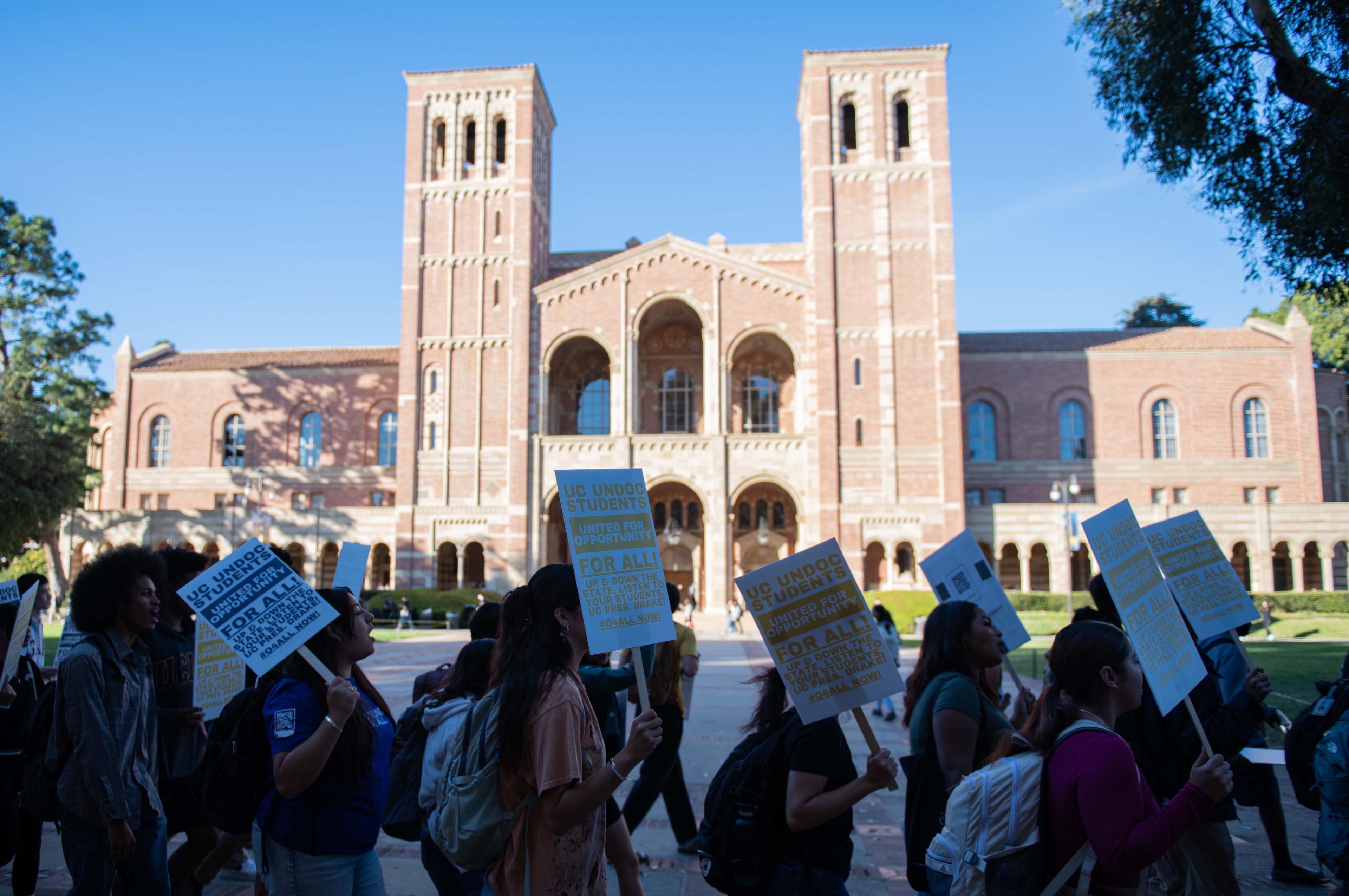UC Board of Regents puts off decision announcing undocumented hiring plan
Students marched Tuesday to advocate for the UC to implement an undocumented student employment plan. (Brandon Morquecho/Assistant Photo editor)
This post was updated Nov. 19 at 9:06 p.m.
The UC Board of Regents delayed an announcement regarding the employment of students without legal status, leaving the board two weeks to meet its self-imposed deadline of producing a plan that would allow thousands of students to apply for on-campus positions.
The regents established a working group – composed of regents and UC President Michael Drake – in May and committed to releasing a potential implementation plan by Nov. 30. UC leaders did not comment at Thursday’s meeting on when they expect to release their findings. Their announcement responded to a yearlong UC-wide campaign led by students without legal status and progressive legal scholars who support an untested legal theory that argues federal employment and immigration law does not apply to state entities, including public universities.
[Related: Hundreds of students call for UC to implement undocumented student hiring plan]
At an open-session meeting, Drake said the regents will continue to deliberate on the implementation of a plan to ensure students can apply to UC campus positions regardless of their immigration status. He cited potential legal concerns and the complexity of the issue as reasons for the delay. The working group has convened nearly 10 times since its formation and met with advocates and UC students multiple times, he added.
“The legal considerations are numerous, and, after several discussions with the stakeholders involved, we’ve concluded that it is in everyone’s best interest to continue to study the matter further,” Drake said. “We want to ensure that we are considering possible alternatives and all possible ramifications. Most importantly, we want to make sure that our undocumented students are protected in any scenario we decide to pursue.”
The announcement comes after student organizers disrupted public comment demanding to speak with the working group about the plan. No arrests were made, said Karely Amaya Rios, a public policy graduate student without legal status who helped lead the disruption.
An impromptu closed-session meeting with advocates and several regents followed. During the session, some regents expressed support for implementation, said Amaya Rios, who is also an organizer leading the campaign. Two regents told organizers they are trying to get the whole working group on the same page, she added.
In the months preceding the announcement, conservative legal scholars and some Republican lawmakers have said the newly developed legal theory will fail under the scrutiny of law, thrusting the University into a lawsuit if it chooses to pursue implementation.
Ahilan Arulanantham, faculty co-director for the Center for Immigration Law and Policy, said before the announcement that many of the concerns are ideological and do not engage with the theory put forth by scholars, adding that it’s not clear if a third-party or another state’s government would have standing to challenge the policy. Whether the federal government decides to challenge the policy remains to be seen, but that decision might only be made after the UC commits to a plan, he said.
Arulanantham also expressed concerns over whether the regents appropriately considered input from campaign leaders. The working group has consulted with campaign leaders, but Arulanantham said he was unsure if the meetings would produce a result in the upcoming year.
“I don’t see why it couldn’t be done for January or for students who would be hired in January,” Arulanantham said. “It seems very doable.”
Supporters of the campaign are disappointed but not surprised by the regents’ decision to delay an announcement, said Jeffry Umaña Muñoz, an organizer with the Undocumented Student-led Network and a fourth-year Chicana/o and Central American studies and labor studies student. The vast majority of opposition to the legal theory is coming from critics who have historically opposed pro-immigration policies in general, Arulanantham said.
In an emailed statement, Ryan King, a UC Office of the President spokesperson, pointed to Drake’s comments at the meeting. He did not answer questions about whether a plan would be announced in the coming weeks.
Umaña Muñoz said this delay will not halt the campaign, and organizers will continue to push the regents to announce an implementation plan.
“We are not weakened in our ability to keep organizing, to keep pushing forward and to come back every single time that we’re needed to,” he said. “Even when they don’t call us into the room.”
